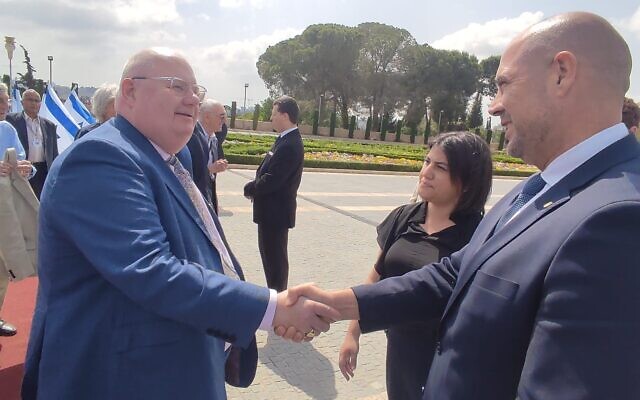Visiting British Lords warn of potential fracture in Israel’s institutions
Group from UK’s upper house following Israel’s judicial overhaul with concern, but see it as symptom of broader trends
Lazar Berman is The Times of Israel's diplomatic reporter

A group of British Lords in Israel expressed concern this week over the state of Israeli politics, calling the ongoing fight over judicial reform a “symptom” of systemic problems.
“I’m absolutely persuaded that the reform argument at the moment is a symptom of something much wider,” Gisela Stuart, Baroness of Edgbaston, told The Times of Israel in Jerusalem on the first day of the visit, which ended on Thursday.
“In politics, it usually is [that] when something comes to that kind of crisis, it’s about something deeper,” the German-born parliamentarian continued. “If there’s a feeling that the checks and balances and the rights of things to be done are out of kilter, then you really stress-test your institutions.”
“[Israel’s] institutions are being stress tested in terms of robustness.”
The Netanyahu government’s attempt to see through sweeping restrictions on the power of the courts has led to massive street demonstrations for and against the measure.
Talks between the sides have been taking place under President Isaac Herzog’s auspices at his official residence, but have yet to produce any agreement.

Stuart, a former Labour MP who now does not affiliate with a party, sees Israel’s domestic unrest as part of a trend across the democratic world.
“There’s a fracture happening in democratic institutions, not just here,” she posited. “We saw it in the UK, we see it in the United States of America, we will see it in other countries.
“Rather than having rational debates — we used to have discussions where we say, I disagree with you — whereas now we say, you’re wrong and you’re bad.”
The 20-strong group from the All-Party Parliamentary Group for Britain-Israel represents the largest official delegation from the British upper house to visit.
The trip, organized in conjunction with the European Leadership Network, included meetings with Knesset Speaker Amir Ohana, Likud MK Hanoch Milwidsky, Yifat Shasha-Biton from the opposition New Hope party, Intelligence Minister Gila Gamliel, and senior Palestinian Authority officials in Ramallah.
Lord David Wolfson of Tredegar, a former justice minister in the House of Lords, stressed the high regard in which jurists around the world hold Israel’s justices.
He recalled taking a delegation of British lawyers and civil servants to Israel, the UAE, and Qatar after the signing of the Abraham Accords in 2020.
Why must Israel and the UK join forces to defeat Iran’s dangerously destabilizing moves?
Minister of Intelligence @GilaGamliel in her meeting with our UK Lords Delegation tells Peers: “the same #Iran that calls for death to Israel also calls for death to the UK” pic.twitter.com/MxFmX4Jckj
— ELNET (@elnetwork_eu) May 30, 2023
“The meeting that stood out for many people was the meeting with Israeli Supreme Court judges,” said Wolfson, an Orthodox Jew who maintains a home in Israel. “These are people of the highest quality. They give Israel luster internationally. Not just the fact that Israel has an independent judiciary, the rule of law, but also the quality of the people who administer it.”
“Tampering with that can do damage to Israel’s image abroad,” Wolfson cautioned while adding that he would like to see British citizens demonstrating as passionately as Israelis have in support of the rule of law.
A judicial system is not a buffet. You can’t cherry pick.
“It is not helping Israel externally,” Stuart concurred.
At the same time, Wolfson added, Knesset Constitution, Law and Justice Committee chair Simcha Rothman — one of the reform’s chief architects — is “doing it for the best of motives.”
But Wolfson had critiques of the proposals put forth by Rothman and Justice Minister Yariv Levin.
“I think he’s going too far, too fast,” said Wolfson. “I don’t think there’s another country in the world which has the system that would be put in place if these reforms go through it. There are countries which have elements of it. But a judicial system is not a buffet. You can’t cherry-pick.”

Lord Eric Pickles, the UK special Envoy for post-Holocaust issues and Chair of the Conservative Friends of Israel in the House of Lords, was more sanguine about the impact the judicial fight is having on Israel’s standing in the UK.
He said that “for most people in the UK, it just passes them by,” and that Israel “has experienced quite a change in its perception for the good” in the country.
“It’s not just seen now as a good ally,” said Pickles. “Frankly without Israel’s medicines and innovations, we’d have been a real mess. We’ve also seen a number of moves together in terms of cardiothoracic work and on dementia, and there’s quite a number of Israeli companies now on the UK stock market. So the degree of integration between our two economies is no longer sort of building bombs and oranges. Things have really moved on.”









